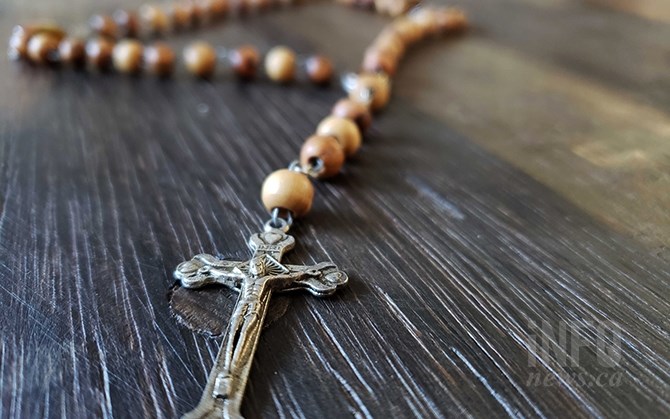
(PARKER CROOK / iNFOnews.ca)
November 27, 2020 - 6:30 AM
Several municipalities in the Okanagan have broken religious neutrality laws by holding prayers during their inaugural council meetings.
The City of Armstrong, the District of Peachland and the Township of Spallumcheen were all found to have violated the Canadian constitution by beginning with a prayer at their inaugural council meetings in 2018.
Of the 162 municipalities in the province, 23 were found to have delivered prayers during inaugural council meetings, according to a recent report by the B.C. Humanist Association.
"That violates the separation of religion and government and violates the state's duty of religious neutrality," B.C. Humanist Association research coordinator Teale Phelps Bondaroff told iNFOnews.ca. "(It) is not the act of prayer itself, it's the state endorsing one religion or other religions, or religion over non-religion."
While saying a prayer at the beginning of a council meeting may not sound like much, in 2015 the Supreme Court of Canada ruled the practice was discriminatory and a violation of the state’s duty of religious neutrality.
Phelps Bondaroff said the ruling was not well known and his organization's report, The Duty of Neutrality Beyond Saguenay: Unconstitutional Prayers at Municipal Councils in British Columbia, highlighted that fact.
Armstrong Mayor Chris Pieper said he wasn't aware that holding prayers at the beginning of council meetings wasn't allowed.
"I've been on council since the late eighties and whenever there was an election and we started a new council we had one of the ministers within our community give a prayer," he said. "We've had almost every church represented within our community."
Mayor Pieper said he would respect the Supreme Court ruling but he didn't agree that prayers shouldn't be allowed at council.
"They don't pray for us to do a good job, they pray for our community, they pray for strong leadership and honest leadership and integrity, that's what it's about," he said.
Peachland Mayor Cindy Fortin said she didn't agree with the prayer that was read out at council's inaugural meeting in 2018.
"Because it had traditionally been done over the decades, it was done again," Fortin said. "I definitely brought it up at the time that I didn't think we should be doing it."
Fortin said if she does run again in 2022 and wins, she'll make sure a prayer won't be readout.
"It's nothing personal against anyone's religion," she said. "I agree with the idea that church and state should be separate."
According to the report of the 23 municipalities that did have prayers readout 100 per cent were Christian and 73 per cent were readout by men.
The 2015 Supreme Court ruling came about after a resident of Saguenay, Quebec, objected to prayers at local council meetings and his concerns escalated all the way to the country's highest court.
Phelps Bondaroff said it was legitimate that many municipalities didn't know about the law, and the Humanist Association had written to all municipalities it found to have violated the ruling.
Spallumcheen wrote back confirming it wouldn't be having a prayer at its inaugural meetings again. The report says Armstrong and Peachland didn't write back.
While the three municipalities' prayers were found to have violated the constitution, the City of Kelowna also had a "First Nations Prayer" delivered during one of its meetings.
However, Indigenous blessings that took place during inaugural meetings were excluded from the study.
Phelps Bondaroff describes it as "very complex" issue and a grey area.
"We did find a number of municipalities that had indigenous content that was kind of a borderline case," he said. "Obviously territorial acknowledgments are important, welcome ceremonies are important, the questions of whether a pray or a blessing regardless of the content being acceptable is an open question.”
To read the full report go here.
To contact a reporter for this story, email Ben Bulmer or call (250) 309-5230 or email the editor. You can also submit photos, videos or news tips to the newsroom and be entered to win a monthly prize draw.
We welcome your comments and opinions on our stories but play nice. We won't censor or delete comments unless they contain off-topic statements or links, unnecessary vulgarity, false facts, spam or obviously fake profiles. If you have any concerns about what you see in comments, email the editor in the link above.
News from © iNFOnews, 2020